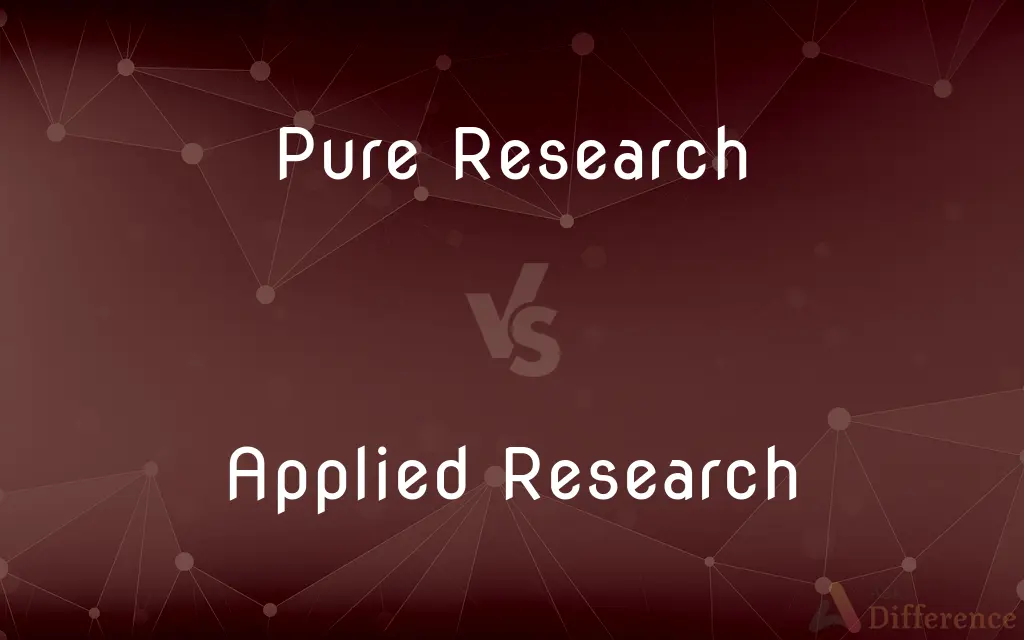Pure Research vs. Applied Research — What's the Difference?
Edited by Tayyaba Rehman — By Fiza Rafique — Published on December 4, 2023
Pure Research seeks fundamental knowledge without immediate application, while Applied Research aims to solve specific, practical problems.

Difference Between Pure Research and Applied Research
Table of Contents
ADVERTISEMENT
Key Differences
Pure Research, also known as basic or fundamental research, is driven by curiosity and the desire to expand knowledge in a particular field. This type of research isn't primarily concerned with addressing immediate practical issues. In contrast, Applied Research focuses on applying existing knowledge to solve real-world challenges.
Both Pure Research and Applied Research have distinct value in the scientific community. While Pure Research helps lay the groundwork by exploring and understanding fundamental principles and theories, Applied Research leverages this foundation to address immediate needs and concerns. Each plays a significant role in advancing knowledge and innovation.
For instance, when a scientist studies the basic properties of a new material without a direct application in mind, they're conducting Pure Research. However, when another researcher takes this knowledge and investigates how the material can be used in manufacturing or technology, they are engaging in Applied Research.
Moreover, the outcomes of Pure Research can be unpredictable. It might lead to groundbreaking discoveries or even reshape our understanding of a subject. On the other hand, Applied Research has a more directed goal, aiming to produce tangible results that can be immediately utilized.
In summary, while Pure Research is curiosity-driven and seeks to build a knowledge base, Applied Research is more pragmatic, aiming to find solutions to specific issues using the existing knowledge base.
ADVERTISEMENT
Comparison Chart
Primary Goal
Knowledge expansion
Problem-solving
Driven By
Curiosity
Practical needs
Outcome
Theoretical understanding
Practical applications
Predictability of Outcome
Unpredictable results
Directed, expected outcomes
Example
Studying quantum mechanics
Developing new medical treatments
Compare with Definitions
Pure Research
Academic or theoretical research without a direct application.
The mathematical proof of the four-color theorem is an example of Pure Research.
Applied Research
Research aiming to solve specific problems.
Research to develop a new vaccine is an example of Applied Research.
Pure Research
The pursuit of knowledge for its own sake.
Einstein's work on relativity was initially a form of Pure Research.
Applied Research
Targeted studies for tangible outcomes.
The development of more efficient solar panels results from Applied Research.
Pure Research
Investigation into fundamental principles.
The exploration of the human genome began as Pure Research.
Applied Research
Research translating theory into practical solutions.
Translating a scientific discovery into a new medical treatment is Applied Research.
Pure Research
Research driven by curiosity without immediate practical use.
The study of black holes began as Pure Research before any practical implications were known.
Applied Research
Investigation directed towards immediate practical use.
Companies conduct Applied Research to improve their products.
Pure Research
Exploration that expands understanding without seeking immediate utility.
Many groundbreaking discoveries in theoretical physics start as Pure Research.
Applied Research
Use of existing knowledge to address real-world issues.
Engineers use Applied Research to design safer cars.
Common Curiosities
How does Applied Research differ in its objectives?
Applied Research aims to address specific, real-world problems using existing knowledge.
Is Pure Research essential for scientific progress?
Yes, Pure Research lays the foundation for understanding, which can later lead to applied innovations.
What's the main purpose of Pure Research?
The main purpose of Pure Research is to expand and deepen knowledge without immediate practical application.
Can findings from Pure Research lead to applications later on?
Absolutely, many groundbreaking applications arise from insights gained through Pure Research.
Are businesses more interested in Pure Research or Applied Research?
Typically, businesses focus on Applied Research to address immediate needs and market demands.
Is Applied Research more result-oriented?
Yes, Applied Research typically targets tangible and immediate outcomes.
Can Applied Research influence Pure Research?
Yes, findings in Applied Research can raise new questions or areas of interest for Pure Research.
Can a research project combine elements of both Pure and Applied Research?
Yes, some research projects may begin as Pure Research and evolve into Applied Research.
Is Pure Research often theoretical?
Pure Research often has a strong theoretical component, seeking to understand underlying principles.
Which type of research is more predictable in outcomes?
Applied Research generally has more predictable outcomes, while Pure Research can lead to unexpected discoveries.
Are universities more focused on Pure Research?
Many universities prioritize Pure Research to advance knowledge, but they also engage in Applied Research projects.
Which type of research is more funding-intensive?
Both can be funding-intensive, but Applied Research often requires more resources due to development and testing phases.
What's an example of a field benefiting from both research types?
Medicine benefits from both: Pure Research helps understand diseases at a fundamental level, while Applied Research leads to treatments.
Can Pure Research lead to commercial products?
While Pure Research is not driven by commercial needs, its findings can eventually inspire or lead to commercial products.
Is curiosity the main driver for Pure Research?
Yes, Pure Research is often driven by curiosity and the desire to expand knowledge.
Share Your Discovery

Previous Comparison
Whipping Cream vs. Heavy Cream
Next Comparison
Preparative Centrifugation vs. Analytical CentrifugationAuthor Spotlight
Written by
Fiza RafiqueFiza Rafique is a skilled content writer at AskDifference.com, where she meticulously refines and enhances written pieces. Drawing from her vast editorial expertise, Fiza ensures clarity, accuracy, and precision in every article. Passionate about language, she continually seeks to elevate the quality of content for readers worldwide.
Edited by
Tayyaba RehmanTayyaba Rehman is a distinguished writer, currently serving as a primary contributor to askdifference.com. As a researcher in semantics and etymology, Tayyaba's passion for the complexity of languages and their distinctions has found a perfect home on the platform. Tayyaba delves into the intricacies of language, distinguishing between commonly confused words and phrases, thereby providing clarity for readers worldwide.
















































